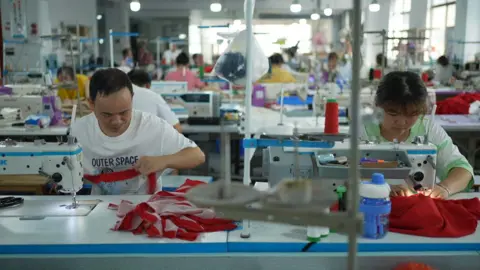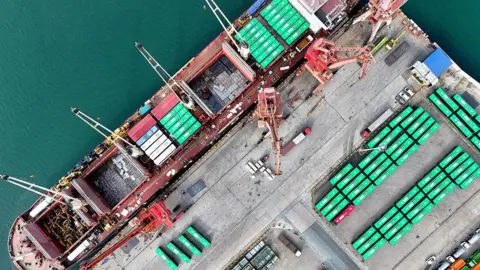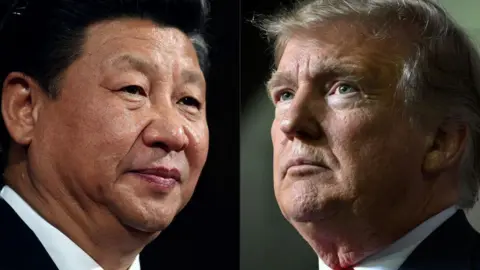
BBC
The tariffs imposed by Trump on imports from China are devastating major exporters such as the fast-fashion brand Shein.
China is rallying for global solidarity against Trump’s tariffs as its exporters face the pressure of new US levies, which have skyrocketed to 104%.
An editorial in the state-owned newspaper China Daily stated, “Global unity can triumph over trade tyranny,” highlighting Beijing’s partnerships with Japan, South Korea, and other Asian nations. Another article called on the European Union to join in preserving free trade and multilateralism.
Foreign Ministry spokesperson Lin Jian expressed China’s firm opposition to what they perceive as hegemonic and coercive tactics, stating this during a press briefing on Wednesday.
The timing of the tariffs is particularly challenging as China’s economic growth remains sluggish, with domestic consumption lacking and exports being a critical contributor to growth.
The extensive nature of these tariffs has left Chinese firms frantically trying to adapt their supply chains; many report that navigating this uncertainty is proving difficult.
According to the owner of a Chinese business specializing in cross-border logistics, these tariffs would compromise their “already razor-thin profit margins,” though they wished to remain anonymous.
“Increased tariffs elevate costs for freight forwarders, factories, and sellers alike. Ultimately, it results in diminished earnings across the board,” they explained.
Analysts warn that any tariff over 35% could obliterate profits for Chinese firms exporting to the US or Southeast Asia, according to Dan Wang from the Eurasia Group consultancy.
She added, “With exports representing between 20% and 50% of growth post-Covid, growth is bound to slow down significantly.”
While China has not publicly declared any retaliatory actions, there are rumors that Beijing may consider halting the import of Hollywood films and reducing cooperation on fentanyl with the US, according to Liu Hong, a senior editor at the state-run Xinhua news agency.
This uncertainty is concerning for companies like Fuling, which supplies disposable tableware to major US fast-food chains such as McDonald’s and Wendy’s. They have indicated that the additional tariffs would have a “significant impact” on their business, noting that nearly two-thirds of their revenue in 2023 and in the first half of the previous year came from the US.
To mitigate tariff impacts, Fuling, based in China’s Zhejiang province, has initiated operations at a new factory in Indonesia late last year.
However, Trump’s recent tariffs add another layer of uncertainty, as exports from Indonesia now face a 32% duty, according to a recent company report.

Getty Images
Numerous Chinese companies express that these tariffs deliver a “devastating blow” to their already narrow profit margins.
Countries like Indonesia were included in the wave of tariffs announced by President Trump last week, which he claims will boost the US economy.
However, economists have cautioned that such measures could lead to recessions both in the US and globally. The tariffs have also unsettled international markets and attracted criticism from influential business leaders, including Trump’s supporter Elon Musk.
Trump’s tariffs comprise a baseline 10% charge on most foreign imports into the US, along with higher fees for what he refers to as the “worst offenders,” which currently includes Cambodia (49%), Vietnam (46%), and Thailand (36%), countries that have thrived on strong export performance.
Following China’s announcement of retaliatory tariffs, Trump responded by increasing duties on imported Chinese goods, raising them to over 104%.
The logistics business owner shared with the BBC that he remains hopeful China may negotiate to reduce some of these tariffs: “Only a final decision will allow us to plan our next moves.”
Although China has signaled a willingness to engage in discussions, Trump has not communicated with Chinese leader Xi Jinping since his return to the White House.
The American Chamber of Commerce in China has warned that such sweeping tariffs will likely have more adverse effects than positive, highlighting this in correspondence to its member companies.
Their memo, signed by Chair Alvin Liu and President Michael Hart, conveyed, “This magnitude of disruption is unprecedented, and we remain unsure how these actions will benefit consumers in either nation or the broader global economy.”

Getty Images
Trump has yet to resume dialogue with Xi since returning to the White House.
Certain analysts suggest that these tariffs may compel China to restructure its economy, pushing it to rely significantly on domestic consumer spending, which has been a challenge to enhance.
Otherwise, these tariffs may prove nonviable for China in the long run, said Tim Waterer from KCM Trade brokerage.
A freight company manager, wishing to remain anonymous, noted that the tariffs appear to be strategically aimed at undermining China’s economic position.
He also pointed out that many Southeast Asian countries experiencing steep tariffs, like Vietnam and Cambodia, are where numerous Chinese firms have relocated their operations.
The Tianjin-based company intends to discuss cost-sharing strategies with its American clients regarding the tariffs. “Each case presents its own dynamics, but the total impact has been quite significant,” he remarked.
Meanwhile, Wu Changchun, manager of a freight company primarily operating between China and Cambodia, has reported a decline in shipping volume.
He has also detected lags in several construction projects in Cambodia that have stagnated post the tariff announcement.
“If tariffs were at 10% or 20%, companies might still manage the costs through supply chain optimization, margin adjustments, and collaborative efforts. Trade could persist… [However, with tariffs at 104%], that no longer allows for feasible trade-offs,” asserted Mr. Wu, General Manager at Maritima Maruba.
“This signifies full-scale decoupling. Trade would essentially cease altogether.”
Additional reporting by Annabelle Liang











 Bengali (Bangladesh) ·
Bengali (Bangladesh) ·  English (United States) ·
English (United States) ·